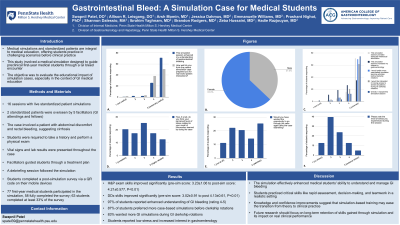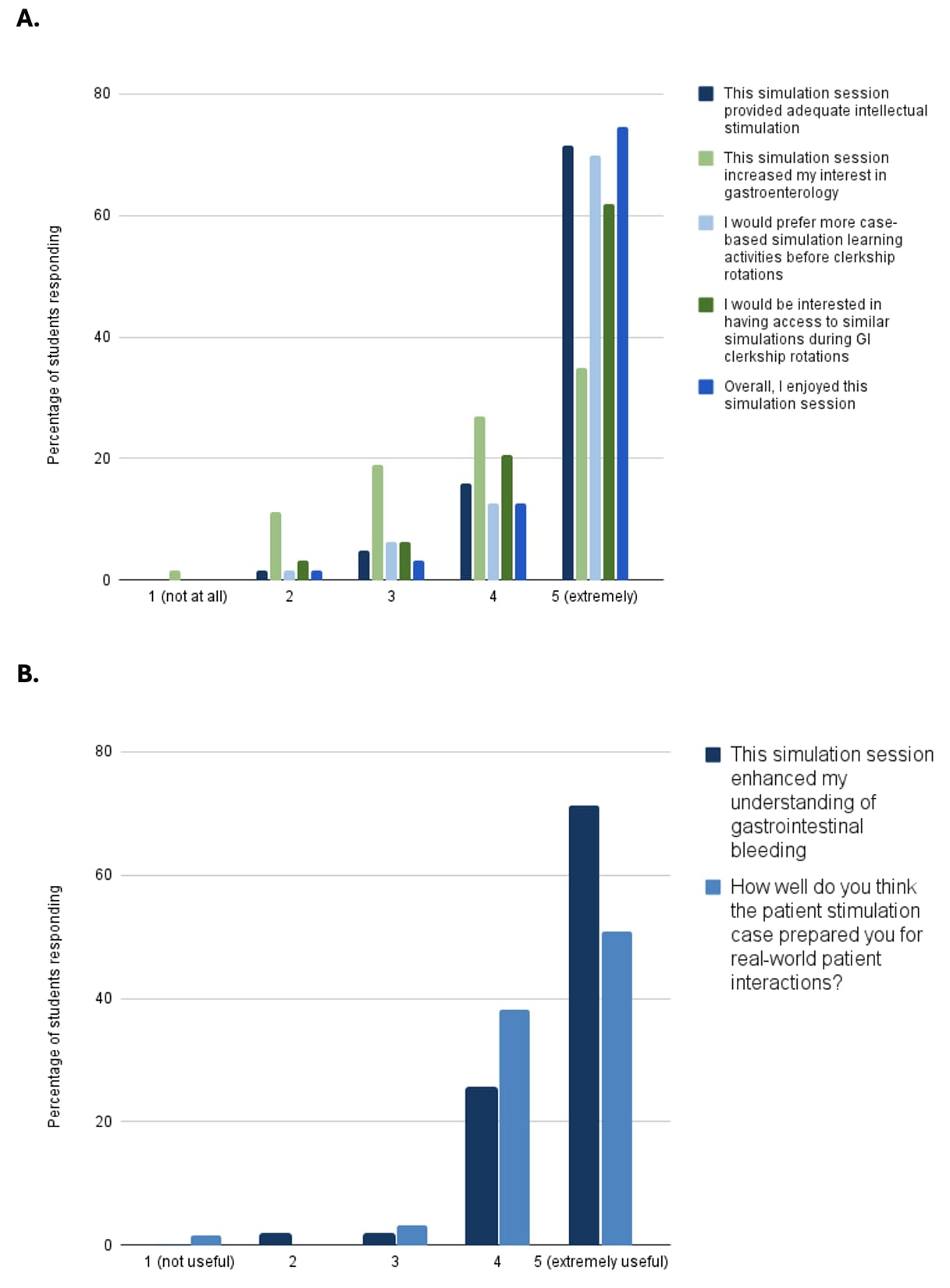Monday Poster Session
Category: GI Bleeding
P2458 - Gastrointestinal Bleed: A Simulation Case for Medical Students
Monday, October 28, 2024
10:30 AM - 4:00 PM ET
Location: Exhibit Hall E

Has Audio
.jpg)
Swapnil Patel, DO
Penn State Health Milton S. Hershey Medical Center
Hummelstown, PA
Presenting Author(s)
Award: Presidential Poster Award
Swapnil Patel, DO1, Allison Leisgang, DO2, Arsh Momin, MD2, Jessica Dahmus, MD2, Emmanuelle Williams, MD2, Prashant Nighot, PhD3, Shannon Dalessio, MA4, Ibrahim Yaghnam, MD1, Brandon Rodgers, MD2, Zeba Hussaini, MD2, Hadie Razjouyan, MD2
1Penn State Health Milton S. Hershey Medical Center, Hummelstown, PA; 2Penn State Health Milton S. Hershey Medical Center, Hershey, PA; 3Penn State College of Medicine, Hershey, PA; 4Penn State Health, Hershey, PA
Introduction: Medical simulations and standardized patients are now a mainstay of medical education, allowing students to practice challenging situations before starting clinical practice. In this study, we created a medical simulation to guide first-year medical students through a GI bleed encounter. Our objective was to evaluate the educational impact of simulation cases, particularly in the context of GI medical education.
Methods: After participating in a patient simulation case with a live standardized patient, students completed a survey assessing the impact of the case on their confidence, knowledge, and diagnostic skills. Sixteen simulation sessions, involving 2 standardized patients were overseen by 5 facilitators composed of GI attendings and fellows. The case featured a patient with abdominal discomfort and rectal bleeding, requiring students to take a history and perform a physical exam suggestive of cirrhosis. Key vital signs and lab results were presented to students throughout the case and they were eventually guided through a treatment plan.
Results: Of the 77 first-year medical students who participated in the simulation, 58 fully completed the survey. For this analysis, we included 63 subjects who completed the survey to at least 33%. Of these participants, 63% were female. Students' ability to perform a history and physical exam improved significantly from a pre-sim score of 3.23±1.06 to a post-sim score of 4.21±0.577 (P< 0.01). Similarly, their ability to develop a differential diagnosis improved significantly from 3.02±0.91 to 4.13±0.61 (P< 0.01). As seen in Figure 1, approximately 97% of students reported that the simulation enhanced their understanding of GI bleeding (rating 4-5). Additionally, 87% expressed a preference for more case-based simulation learning activities before clerkship rotations, and 83% specifically wanted more GI simulations during GI clerkship rotations.
Discussion: This simulation case proved as an effective tool to enhance medical students' abilities to understand and manage GI bleeding. The simulation allowed for the realistic practice of critical skills, such as rapid assessment, decision-making, and teamwork. The improvements observed in knowledge and confidence suggest that integrating simulation based training into the medical curriculum could improve the transition from theoretical learning to clinical practice. Future research should explore the long-term retention of skills acquired through simulation and the impact on actual clinical performance.

Disclosures:
Swapnil Patel, DO1, Allison Leisgang, DO2, Arsh Momin, MD2, Jessica Dahmus, MD2, Emmanuelle Williams, MD2, Prashant Nighot, PhD3, Shannon Dalessio, MA4, Ibrahim Yaghnam, MD1, Brandon Rodgers, MD2, Zeba Hussaini, MD2, Hadie Razjouyan, MD2. P2458 - Gastrointestinal Bleed: A Simulation Case for Medical Students, ACG 2024 Annual Scientific Meeting Abstracts. Philadelphia, PA: American College of Gastroenterology.
Swapnil Patel, DO1, Allison Leisgang, DO2, Arsh Momin, MD2, Jessica Dahmus, MD2, Emmanuelle Williams, MD2, Prashant Nighot, PhD3, Shannon Dalessio, MA4, Ibrahim Yaghnam, MD1, Brandon Rodgers, MD2, Zeba Hussaini, MD2, Hadie Razjouyan, MD2
1Penn State Health Milton S. Hershey Medical Center, Hummelstown, PA; 2Penn State Health Milton S. Hershey Medical Center, Hershey, PA; 3Penn State College of Medicine, Hershey, PA; 4Penn State Health, Hershey, PA
Introduction: Medical simulations and standardized patients are now a mainstay of medical education, allowing students to practice challenging situations before starting clinical practice. In this study, we created a medical simulation to guide first-year medical students through a GI bleed encounter. Our objective was to evaluate the educational impact of simulation cases, particularly in the context of GI medical education.
Methods: After participating in a patient simulation case with a live standardized patient, students completed a survey assessing the impact of the case on their confidence, knowledge, and diagnostic skills. Sixteen simulation sessions, involving 2 standardized patients were overseen by 5 facilitators composed of GI attendings and fellows. The case featured a patient with abdominal discomfort and rectal bleeding, requiring students to take a history and perform a physical exam suggestive of cirrhosis. Key vital signs and lab results were presented to students throughout the case and they were eventually guided through a treatment plan.
Results: Of the 77 first-year medical students who participated in the simulation, 58 fully completed the survey. For this analysis, we included 63 subjects who completed the survey to at least 33%. Of these participants, 63% were female. Students' ability to perform a history and physical exam improved significantly from a pre-sim score of 3.23±1.06 to a post-sim score of 4.21±0.577 (P< 0.01). Similarly, their ability to develop a differential diagnosis improved significantly from 3.02±0.91 to 4.13±0.61 (P< 0.01). As seen in Figure 1, approximately 97% of students reported that the simulation enhanced their understanding of GI bleeding (rating 4-5). Additionally, 87% expressed a preference for more case-based simulation learning activities before clerkship rotations, and 83% specifically wanted more GI simulations during GI clerkship rotations.
Discussion: This simulation case proved as an effective tool to enhance medical students' abilities to understand and manage GI bleeding. The simulation allowed for the realistic practice of critical skills, such as rapid assessment, decision-making, and teamwork. The improvements observed in knowledge and confidence suggest that integrating simulation based training into the medical curriculum could improve the transition from theoretical learning to clinical practice. Future research should explore the long-term retention of skills acquired through simulation and the impact on actual clinical performance.

Figure: Figure 1. Medical Student Perceptions of the Impact of a GI Bleed Patient Simulation Case
Disclosures:
Swapnil Patel indicated no relevant financial relationships.
Allison Leisgang indicated no relevant financial relationships.
Arsh Momin indicated no relevant financial relationships.
Jessica Dahmus indicated no relevant financial relationships.
Emmanuelle Williams indicated no relevant financial relationships.
Prashant Nighot indicated no relevant financial relationships.
Shannon Dalessio indicated no relevant financial relationships.
Ibrahim Yaghnam indicated no relevant financial relationships.
Brandon Rodgers indicated no relevant financial relationships.
Zeba Hussaini indicated no relevant financial relationships.
Hadie Razjouyan indicated no relevant financial relationships.
Swapnil Patel, DO1, Allison Leisgang, DO2, Arsh Momin, MD2, Jessica Dahmus, MD2, Emmanuelle Williams, MD2, Prashant Nighot, PhD3, Shannon Dalessio, MA4, Ibrahim Yaghnam, MD1, Brandon Rodgers, MD2, Zeba Hussaini, MD2, Hadie Razjouyan, MD2. P2458 - Gastrointestinal Bleed: A Simulation Case for Medical Students, ACG 2024 Annual Scientific Meeting Abstracts. Philadelphia, PA: American College of Gastroenterology.

